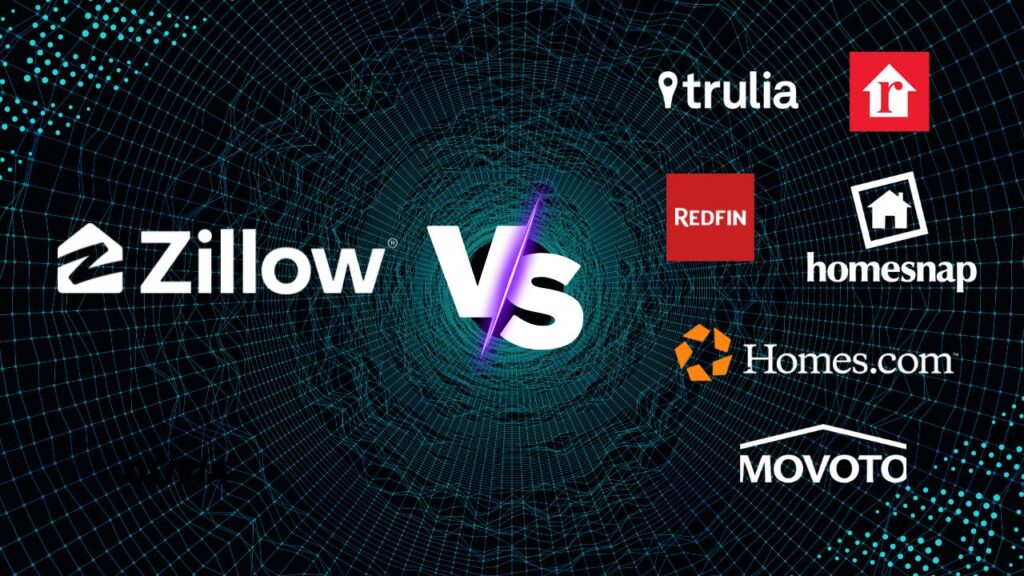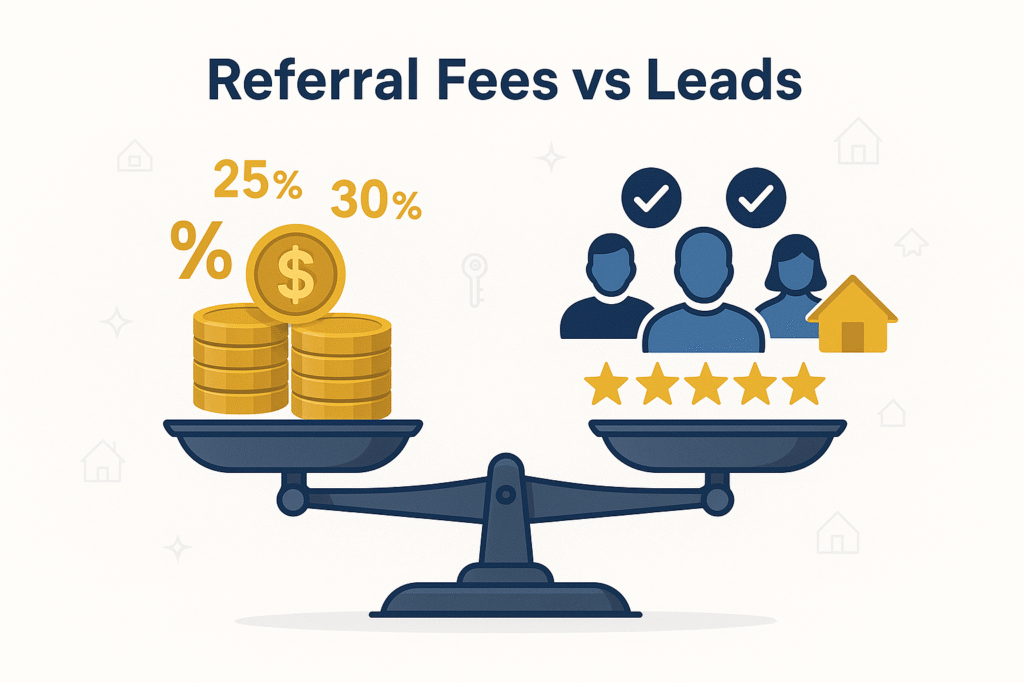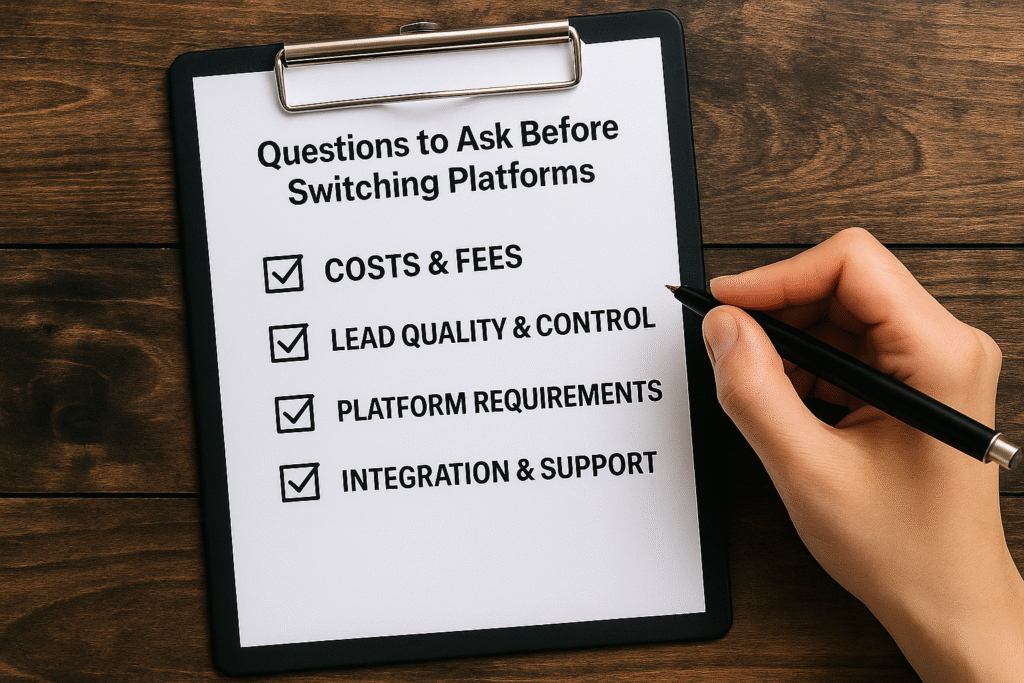If you’re a real estate agent, you’ve probably heard of Zillow Flex – the program that promises to connect you with real, qualified buyers and sellers. And, for many teams, Zillow Flex is a powerhouse in the lead generation space. But let’s be real: no one platform is perfect for everyone.
Maybe the high referral fees are gnawing at your profit margins, or perhaps you didn’t score one of the elusive invitations to join in the first place. Whatever the reason, if you are exploring options other than Zillow Flex, you’re in the right place. This article will explore several real estate lead generation platforms, including the best Zillow Flex alternatives.

Should You Consider Alternatives to Zillow Flex for Real Estate Leads?
If you’ve been following our blog, then you know we are fans of Zillow Flex and have provided a breakdown of the benefits. However, Zillow Flex agents mention a few issues in reviews.
Namely, the referral fees. With Zillow Flex, you might feel like your hard-earned commission is getting smaller before your eyes–– because it is. If you’re looking to keep more of your money and have a little more say in your client relationships, it’s time to consider your options. Zillow Flex is a great choice for teams that do an excellent job closing deals and servicing clients, but just need a more robust pipeline. If the opposite is true–you have lots of leads but not enough time to do an excellent job for them–then Zillow Flex is not likely to be helpful.
Then there’s the whole invitation-only aspect. The approval process has several steps, and you’ll need to meet specific performance criteria. If you’re not invited, you’re missing out on leads, and nobody wants that! Plus, many agents crave more control over their lead generation efforts. Some agents don’t get accepted at all, and then when they do, they need to pay close attention to their KPIs. Letting them slip means losing out on valuable leads.

An Overview: Top Zillow Flex Alternatives
The following platforms represent the most popular and effective alternatives to Zillow Flex, each offering different approaches to lead generation, pricing models, and agent support. While some focus on brand recognition and lead quality, others prioritize cost savings or unique features like mobile-first design and agent branding tools. We’ll break down the costs, features, and pros and cons of each platform to help you determine which option aligns best with your business goals and budget constraints.
Realtor.com
As one of the most established names in online real estate, Realtor.com offers agents access to a trusted platform with strong brand recognition and quality lead generation tools.
Typical Cost
Realtor.com typically charges a monthly fee along with a cost per lead. This pricing structure can vary depending on your market and the specific services you choose. Realtors may pay for leads on Realtor.com, with non-exclusive leads costing around $200/month and exclusive leads costing around $1,000/month, according to Realtor.com. They can also pay variable rates to advertise on the platform.
The Market VIP program, which facilitates co-marketing between real estate brokers and lenders, doesn’t have a fixed cost. Instead, the price is determined by the agreed-upon share of the “In-Scope Service Subscription” fee between the broker and the lender. Realtor.com itself does not charge any additional fees beyond the cost of the broker’s subscription in these instances. The total cost of the In-Scope Service Subscription is shared between the broker and the lender, as per their agreement.
Overview of Features
Realtor.com offers agents access to paid leads from an established and reputable brand. Its user-friendly interface allows both agents and clients to navigate property listings easily, making it a popular choice in the industry. The platform also provides comprehensive property listings, which can help agents showcase homes effectively to potential buyers.
Pros: One of the biggest advantages of Realtor.com is the high quality of leads it generates, which can translate into more successful transactions. Realtor.com also offers a few different programs, like Connection Plus or Market VIP, which means agents can choose the tools that work best for their unique situation. Realtor.com is also known to have excellent integration capabilities with other tools like CRM, which allows agents to automate follow-up and keep a better track of transactions.
Cons: The higher costs associated with using the platform can significantly cut into an agent’s commission, which may deter some from fully committing. Agents also mention that the competitive nature of the platform may lead to lead saturation, making it harder for individual agents to stand out. In other words, leads aren’t exclusive.
Redfin
This technology-focused brokerage takes a different approach by offering agents a salaried position rather than traditional commission-based compensation, along with access to their established client base.
Typical Cost
Redfin operates on a salary model, which means agents typically do not pay referral fees. This unique approach can lead to different financial dynamics compared to traditional commission-based models. Instead, they receive a base salary and bonuses for each home purchase or sale they close. The bonus amount is tied to the home’s sale price. Redfin also covers many of the expenses that traditional agents incur, such as mileage, payroll taxes, and listing costs, effectively saving their agents money.
Overview of Features
Redfin employs salaried agents who want to prioritize providing excellent customer service over traditional commission incentives. Agents say the platform uses innovative technology and tools that enhance the client experience, along with detailed property insights and analytics that help agents make informed decisions. Some buyers and sellers have mentioned that working with a Redfin agent was a great experience.
Redfin Next is a newer program where agents can earn commission splits up to 75% on deals they generate themselves and up to 40% on deals with clients found through the Redfin platform, according to HousingWire. Redfin also covers many of the costs associated with being an agent, including state licensing fees, MLS dues, and more, potentially saving agents over $20,000 annually, according to Redfin.
Pros: One of the primary benefits of working with Redfin is the absence of referral fees, allowing agents to keep more of their earnings. Additionally, the focus on customer service can lead to higher client satisfaction and repeat business, which is a win-win for agents.
Cons: Agents may find that they have less control over lead generation and client relationships, which can be a drawback for those who prefer to manage their own pipelines–remember, you’re essentially an employee of this company. Also, the non-traditional commission structure may not appeal to all agents, particularly those who thrive in a commission-based environment.

Homesnap
This mobile-first platform offers agents a freemium model with collaborative tools designed for agents who prefer working on-the-go and value team coordination features.
Typical Cost
Homesnap operates on a freemium model, offering basic features for free while charging for premium offerings. This allows agents to explore the platform without a large upfront investment.
Real estate agents who subscribe to Homesnap Pro pay a monthly fee, which can be as low as $49.99 per month. For an annual subscription, agents can pay a discounted rate of $299 or $399 for the first year, with subsequent years costing up to $599. Homesnap also offers a commission-based payment option called “Access” where agents can use future commissions to pay for Homesnap products.
Overview of Features
It’s important to know that Homesnap is available as an app only, so if you like to work on a PC, this option probably isn’t for you. Homesnap integrates directly with MLS systems, providing seamless property management for agents. It also features collaborative tools that facilitate communication between agents and clients, and the mobile-friendly app allows agents to access important information on the go.
Pros: The main advantage of Homesnap is its blend of free and premium features, making it accessible to a wide range of agents. Agent reviews also mention that collaborative tools are excellent for teamwork, enabling agents to work together effectively to meet client needs. They mention that the on-the-go nature of the app is really intuitive.
Cons: As noted, relying on an app isn’t every agent’s favorite way to work. Some users may find that the premium features come with additional costs, which could add up over time. Moreover, though the app is said to be easy-to-use, reviews say there’s definitely a learning curve for new users.
Homes.com
This platform puts agent branding and marketing at the forefront, giving real estate professionals the tools to build their personal brand while generating leads through their property listings.
Typical Cost
Homes.com offers various pricing options based on the services selected, allowing agents to tailor their experience to their budget and needs. On Homes.com, agents don’t pay for leads in the traditional sense.
The profiles they offer for agents are free, and agents receive any lead that is generated by their listings. Homes.com doesn’t take a commission on any transactions that result from leads generated through their platform. Agents can also take advantage of a “single listing boost” or a monthly membership which costs about $300 each month (though this can vary, you’ll need to talk to their support for an estimate).
Overview of Features
The platform focuses heavily on agent branding and marketing tools, enabling agents to create a strong personal presence online. It also provides lead generation services that are specifically tailored to individual agents, along with comprehensive property listings and insights.
Pros: One of the standout features of Homes.com is its strong emphasis on personal branding, which helps agents establish a unique identity in a crowded market. Additionally, the flexibility in choosing services based on budget can be appealing for agents at different stages in their careers.
Cons: Some say that the varying pricing can lead to confusion and may discourage some agents from fully using the platform. The brand may not have the same level of recognition as larger platforms like Zillow, which could impact an agent’s reach.
Trulia*
Owned by Zillow, this platform specializes in neighborhood data and community information, making it particularly appealing for agents who want to position themselves as local market experts.
Typical Cost
Real estate agents typically pay for Trulia leads through Zillow Premier Agent, which includes leads from both programs. The cost for these leads varies widely, ranging from $20 to over $100 per lead in competitive markets. Some agents may spend thousands of dollars monthly on Zillow and Trulia leads, with conversion rates varying significantly.
Overview of Features
Trulia is renowned for its extensive neighborhood insights and community data, which can provide valuable context for potential buyers. The platform also offers comprehensive property listings with user-friendly search tools, making it easy for clients to find what they’re looking for.
Pros: A key benefit of using Trulia is the valuable neighborhood insights it offers, which can help agents attract clients by providing them with in-depth information about the areas they’re interested in. As an expert, Trulia can help back up your data when providing market insights. Plus, the familiar interface may appeal to users who are already comfortable navigating Zillow. Not to mention, because it’s owned by Zillow, you can feel confident that the platform will not go away any time soon.
Cons: Despite its strengths, some agents may find that using Zillow and Trulia is redundant (you may see the same leads in both places). Furthermore, the cost can be similar to Zillow’s, potentially affecting an agent’s commission.
*Trulia is a Zillow company, so there is a blend of leads on the Trulia platform. If, for some reason, you have determined you don’t want to leverage Zillow, you may also want to avoid Trulia.
Movoto (previously OJO)
This budget-conscious platform offers agents a cost-effective alternative with multiple lead sources and support services, making it particularly attractive for newer agents or those looking to reduce expenses.
Typical Cost
Movoto generally has lower costs compared to competitors, making it an appealing option for agents looking for budget-friendly lead generation solutions. Movoto agents typically pay a monthly or annual fee and a percentage of their closed transaction income. The exact cost varies, but one source mentions $199 per month or $2000 annually, with a 25% referral fee on all deals, including leases, according to one Reddit thread.
Pro+ is available on an invitation-only basis to a limited number of teams per market. Request an invitation to indicate interest in the program. The Lever program is designed for individual agents, and you can attend an info session to learn more about pricing.
Overview of Features
Movoto offers robust lead generation and referral services that cater to agents looking to expand their reach. The platform is user-friendly and provides local market insights and analytics that can help agents better understand their target audience. Movoto may front the cost of marketing materials and services, such as photography and transaction coordination. Movoto provides access to multiple lead sources, including exclusive access to Zillow Flex and Movoto Pro Team+ leads.
Pros: One of the primary advantages of Movoto is its lower costs, which can make it accessible for more agents, especially those just starting out. Additionally, practical lead generation tools can help agents grow their client base without breaking the bank.
Cons: Users mention that the quality of leads on Movoto may vary, which could lead to potential inconsistencies in conversion rates. Pro+ agents are prioritized when leads are distributed, which not all agents like. And, there’s not much transparency in pricing structures, so you’ll need to do some research there.

Transitioning From Zillow Flex to Alternate Lead Gen Platforms
Already sold on moving away from Zillow Flex?
Keep in mind that transitioning from Zillow Flex to another lead generation platform requires a strategic approach. First, agents should conduct thorough research to identify a suitable alternative that aligns with their business goals and target market (this article is a good place to start, if we do say so ourselves).
Next, they should create a detailed transition plan, outlining timelines and key milestones. It’s essential to communicate the change to current clients and leads, ensuring they understand the new process for reaching out. The agent should also update their marketing materials, including business cards and online profiles, to reflect the new platform.
Investing time in training on the new system is crucial for maximizing its features and capabilities. Teams should make sure that all of their agents understand the new platform and can make the most of the available tools. User adoption will go a long way toward maximizing the ROI of a new platform. And of course, all agents and teams should monitor lead performance closely after the transition, making any necessary adjustments to optimize their strategies. You never know: the numbers may show that you were better off before, and then you can consider transitioning back.
No specific lead generation platform is perfect for every agent. Many Flex reviews state that agents love it, but there are also some really innovative alternatives to Zillow Flex out there. It’s worth your time to review all of the available options and find the perfect fit for your team, budget, and needs.


